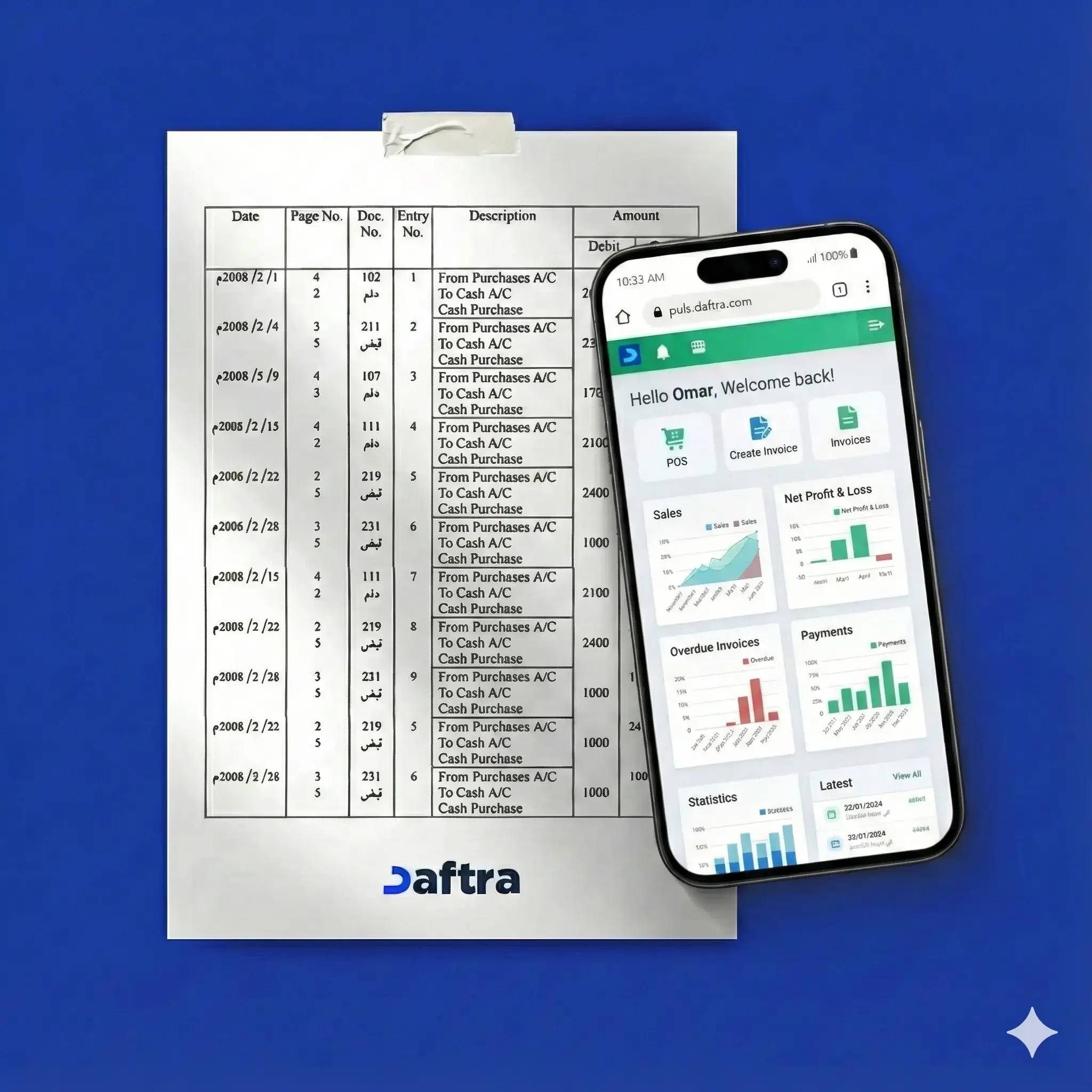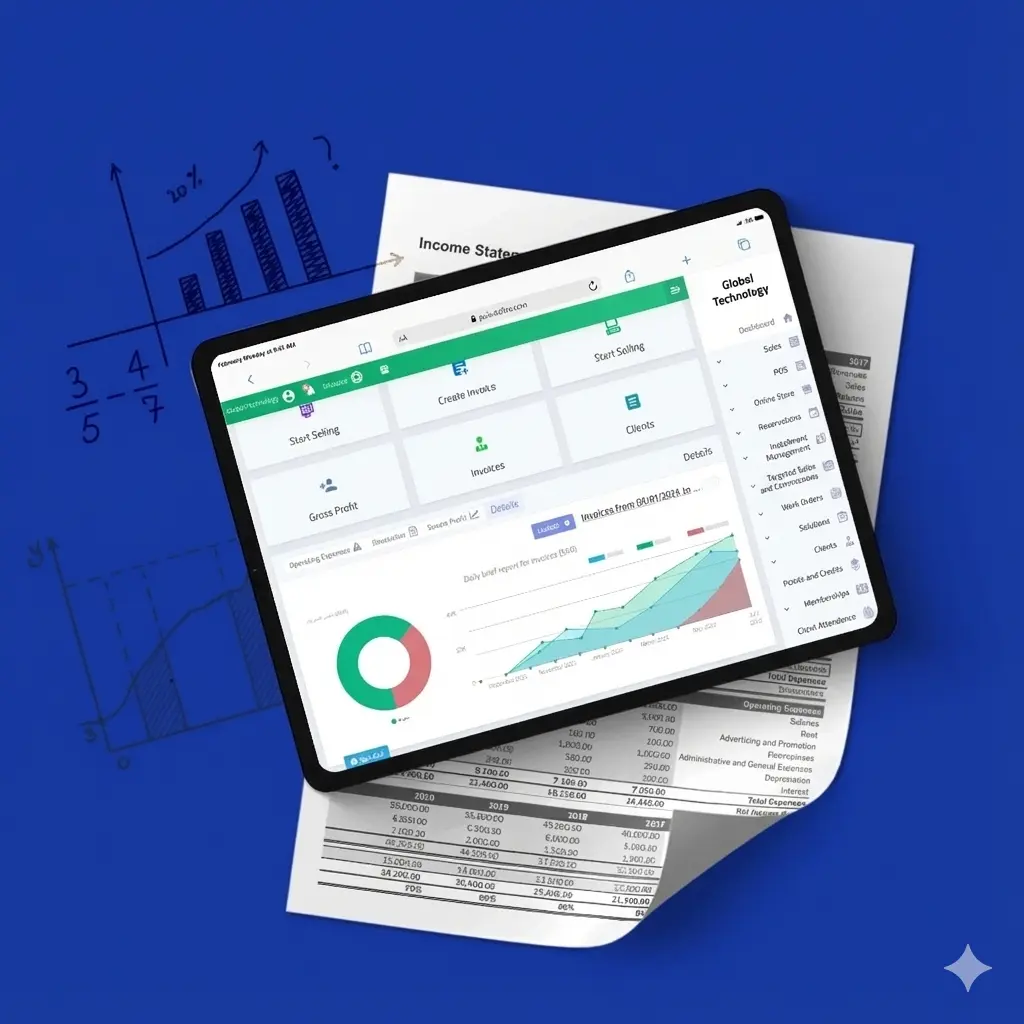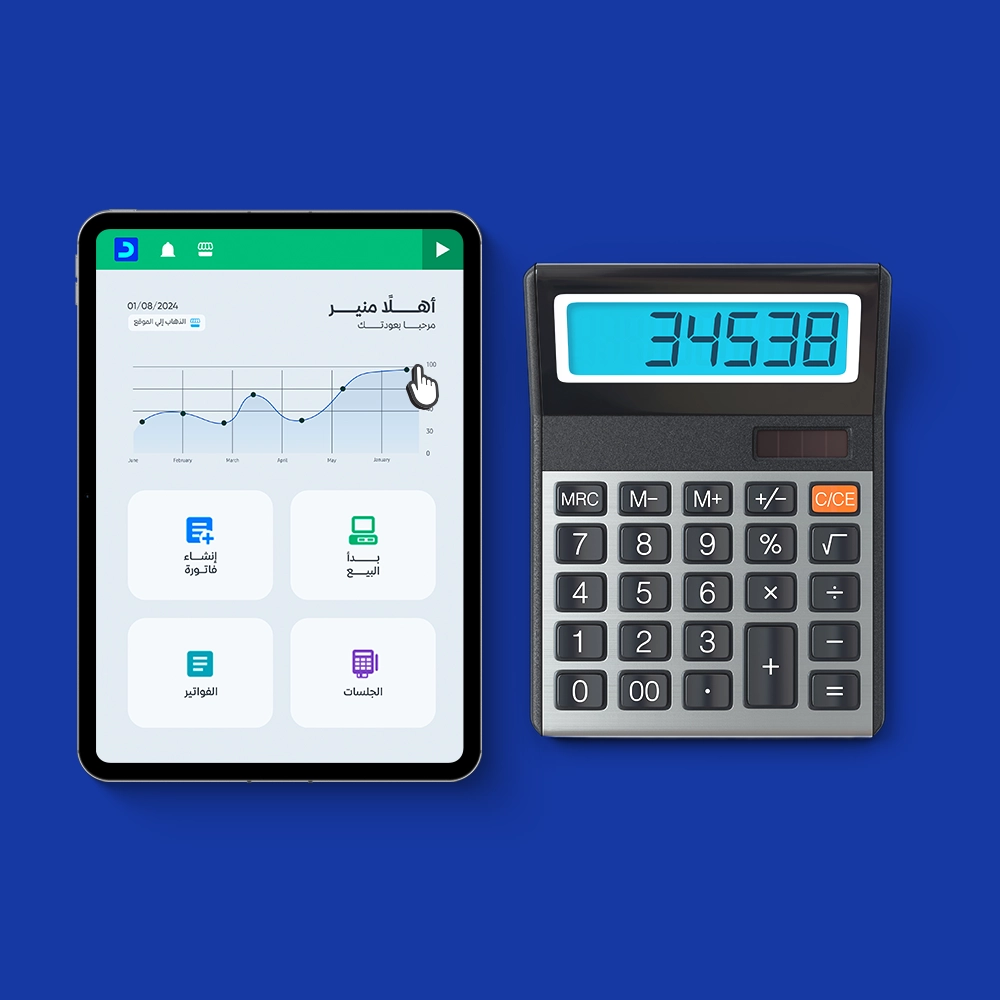Everything You Want to Know About Legal Accounting and How to Become a Legal Accountant

Table of contents:
- What is Legal Accounting?
- What are the Different Objectives of Legal Accounting?
- What is the Importance of Legal Accounting?
- What are the Principles of Legal Accounting?
- What are the Duties and Functions of a Legal Accountant?
- How to Become a Legal Accountant?
- Why Become a Certified Legal Accountant?
- What is the Difference Between a Legal Accountant, a Financial Accountant, and a Managerial Accountant?
- How Does Daftra Make Legal Accounting Easier?
- Frequently Asked Questions
Have you ever wondered about the origin of the word "accounting" that we use daily in most of our purchasing transactions for goods and services? Accounting is the language of business. The word "accounting" refers to the science that studies everything related to commercial activities and financial operations.
For this science to exist, develop, and continue, it needs the people who created it from the beginning. This is where the profession of "accountant" emerged. There are several specializations in accounting science: you find the financial accountant, the management accountant, and finally the legal accountant. To learn what legal accounting is, its objectives and types, as well as the job of a legal accountant and how you can become a certified legal accountant, continue reading this article.
What is Legal Accounting?
From its definition, we find that it relates to laws. While accounting is concerned with accounts and all financial matters, we find that legal accounting specializes in detecting any legal violations related to the financial activities and operations of companies and business owners.
Legal accounting applies a specific system based on monitoring, recording, and analyzing financial statements and accounting data within companies, then obtaining reliable and sound reports for these companies.
What are the Different Objectives of Legal Accounting?
Many people search and wonder, "What does legal accounting aim for?" It has several objectives, including:
1- Law Implementation
Ensuring the application of all accounting laws within companies, thereby enhancing transparency and integrity of work, and achieving justice inside and outside the company.
2- Good Reputation
Proving the absence of any defects or accounting manipulation within the company or institution, thus spreading the good reputation of this company, so that anyone who wants to deal with it feels secure.
3- Calculating All Costs
Auditing the calculation of costs and expenses, as you cannot rely entirely on the company's accountants to track and record costs. Here comes the role of the legal accountant, who accurately records and tracks all outgoing and incoming transactions from and to the company, documenting this information in their records and reports.
4- More Facilities
Providing an easier link for the invoicing system and report generation, which relieves company employees of burdens that are replaced by increased effort in other work, which benefits the company.
From this, we conclude that the main objective of legal accounting is to apply laws in accounting operations while maintaining ease, speed, and assistance in supporting the company's reputation.
What is the Importance of Legal Accounting?
Legal accounting holds great importance in various fields. Here are the benefits and importance of legal accounting in detail for each field:
The Importance of Legal Accounting in the Tax Field
- Providing companies with scientific accounting opinions on many tax matters
- Value-added tax
- Annual tax returns
- What relates to tax inspections and audits within companies
| Daftra software helps you manage your company's taxes in detail while considering value-added tax in your sales operations and providing many options to ensure your tax compliance. |
The Importance of Legal Accounting in Providing Consultations
- Serving companies by involving auditors and accountants in their work, and applying legal accounting within the company
- Providing consultations related to health and social insurance
Assistance in Financial Management
- Financial planning based on analyses obtained through the application of legal accounting
- Taking responsibility for accounting books to know the sources of income and expenses for the company
What are the Principles of Legal Accounting?
Legal accounting is considered one of the most sensitive fields of accounting, as it serves as the supreme authority for the accounting world overall. Therefore, there are several principles that characterize legal accounting. Here are these legal accounting principles in a simplified manner:
1- Separation Principle
Company activities are completely separated from personal activities both in form and substance, as the company is a legal entity that stands on its own.
2- Cost Accounting Principle
Cost is calculated based on its actual value while ignoring any economic changes that may occur due to time or timing differences, such as inflation, for example.
3- Principle of Immediate Revenue Recognition
Revenues are recorded as soon as the company sells the product or provides the service, regardless of the actual time of receiving these revenues.
4- Principle of Obligation to Report Everything Concerning the Company
All challenges and problems faced by the company must be acknowledged with a clear vision of the company's situation from all aspects.
5- Principle of Absolute Perpetuity of the Company
The company is considered a legal entity that does not die or perish; its existence is absolute, so the possibility of dissolution does not apply to it.
6- Principle of Currency Unification
Recording financial data requires a specific currency, which is the US Dollar. Therefore, any currency the company works with is converted to dollars to ensure the accuracy of records.
7- Principle of Varying Judgments
Judgments change based on the given circumstances. A legal accountant may overlook some errors with a weak impact on the company, while taking legal action when errors have a significant impact.
What are the Duties and Functions of a Legal Accountant?
After discussing legal accounting in detail, we will now elaborate on the person who performs this job, who is called a "legal accountant." In order to apply legal accounting, the legal accountant performs several duties and numerous functions, unlike the non-legal accountant. The specializations of the legal accountant expand, and their tasks multiply, for which they are fully responsible.
In the following paragraphs, we will answer the question: What is the functional role of a legal accountant?
1- Financial Audits
Financial auditing is considered the main task of the legal accountant, as they are the person responsible for reviewing and examining all transactions and financial records of the company, in addition to applying GAAP accounting principles.
| The Daftra system helps the legal accountant obtain detailed and accurate financial reports to assist them in financial audits. |
2- Taxes
The legal accountant's tasks regarding taxes are numerous. For example, the legal accountant may issue income tax returns for some companies.
3- Some Administrative Affairs
The role of the legal accountant appears in account management, financial planning, and preparing financial statements.
4- Inspection and Detection of Accounting Fraud
The legal accountant also participates in financial fraud detection operations, preparing financial reports, and presenting them.
5- Providing Advisory Opinion
The legal accountant provides their advisory opinion upon which the company makes crucial decisions, and this is considered the most important function of a legal accountant.
6- Working as an External Representative for the Company
The legal accountant becomes responsible for dealing with any external parties to the company, such as raw material supplier companies or banks that provide loans.
7- Accounting
The legal accountant does not abandon their basic profession simply because they hold a legal title. The legal accountant performs accounting duties such as recording accounts and issuing statements, and accounting books in a natural and official manner.
| Through the Daftra accounting software, the legal accountant performs their role as an accountant ideally, thanks to the integrated program that provides complete accounting reports, automatically records transactions daily, and provides all information and details related to each transaction. This is in addition to complete tools for inventory management, sales, and everything else. This saves the legal accountant a lot of time and effort to complete their work and tasks. |
Based on these paragraphs, the answer to the question "What is the job of a legal accountant?" can be summarized as being responsible for accounting in general, taxes, financial audits, and all matters related to administrative affairs and various consultations.
How to Become a Legal Accountant?
After learning in detail about legal accounting and the role of a legal accountant, the question now is, "How can you become an accountant?" or, to make the question more precise and specific, "How can you become a legal accountant?" There is a purpose in mentioning both questions together for the answer, because you should know that you cannot become a legal accountant overnight. Rather, you must follow several steps to become an official legal accountant.
Steps to Obtain the Certified Legal Accountant Title:
1- Bachelor's Degree in Accounting or Equivalent
Obtain a certified bachelor's degree in accounting or its equivalent from a similar specialization first.
2- Practice Work for a Specified Period
Practice your work as an accountant for no less than three years.
3- Diligent Work Under Supervision
Work with complete dedication and diligence in order to gain sufficient and necessary practical accounting experience to obtain the title, and this is done under supervision.
4- Preparation for the Examination
Apply for the examination to obtain the Certified Public Accountant (CPA) certificate. Once you pass the examination with a score of 75 points, you officially receive the certificate and become a certified legal accountant.
Note: This certificate must be renewed annually by attending some training courses and following up on everything that is suggested and new in the world of accounting.
Why Become a Certified Legal Accountant?
Once you know the requirements for obtaining the certified legal accountant title, several questions certainly come to mind regarding whether this title is worth all this effort and hard work or not! In reality, it may be worth even more, as it is well known that certified legal accountants enjoy several privileges and characteristics that distinguish them and make them shine in the accounting world.
5 Rasons That Make You Understand Why You Should Choose to Be a Legal Accountant:
1- Job Opportunities Availability
Job opportunities multiply for certified legal accountants due to their experience, extensive knowledge, and CPA certification.
2- Expanding Relationships
Expanding professional relationships through communication with certified legal accountants from various countries around the world, and then exchanging accounting skills and experiences.
3- Good Reputation
The elevated scientific and practical status of the legal accountant, which brings them ultimate trust in their opinions, results, and analyses, benefits and builds confidence with the companies they deal with.
4- Rewarding Salaries
As a result of the law of supply and demand, legal accountants constitute a small group in number, which increases the demand for them and consequently earns them rewarding and high salaries compared to non-legal accountants.
5- Opportunity for Continuous Career Development
Legal accountants continuously develop from one position to a higher one, and certainly, with each development, the degree of these previous advantages increases, and the status of the legal accountant rises even more.
What is the Difference Between a Legal Accountant, a Financial Accountant, and a Managerial Accountant?
Perhaps the multiplicity of these titles can cause some confusion and bewilderment, but each accountant - whether legal, financial, or managerial - has an independent definition of their own. We can clarify the difference simply by explaining that a legal accountant can work independently and has extensive experience in legal accounting and accounting in general.
A financial accountant works for companies and cannot work alone or have an external office. They are responsible for everything related to finances within the company, including profits, losses, and other financial matters.
As for the managerial accountant, they are responsible for managerial accounting and everything related to it within the company, and help companies make strategic decisions.
Here is a detailed explanation of each of them:
Legal Accountant
- This is a person who can practice the accounting profession independently, meaning they are authorized to open an office dedicated to legal accounting without working for specific companies.
- They work with professionalism and international expertise due to obtaining the Certified Public Accountant (CPA) certificate.
- They perform several tasks, such as reviewing records and financial operations of companies from the outside and then providing reports.
- A certified legal accountant can work for several different companies at the same time.
Financial Accountant
- This is a person who practices the accounting profession within the company, meaning they do not practice it independently like a legal accountant.
- They record exports and imports, prepare accounting entries and financial statements, and provide reports based on the policies of the company they work for.
- They prepare profit and loss reports for the company and also handle budget distribution.
- They provide financial suggestions based on the current financial system within the company.
- They are responsible for recording all financial transactions that the company conducts at any time.
Managerial Accountant
- This is the person responsible for managerial accounting and everything administrative within the company, such as administrative analyses and administrative reports.
- Their main task is to maximize profit and minimize losses.
- They have an important role in determining the company's position and, therefore, the company's ability to make appropriate decisions at the necessary time.
How Does Daftra Make Legal Accounting Easier?
Legal accounting has its own specificity within the multiple branches of accounting, and no company can do without a legal accountant or at least consulting with one for legal advice to regulate tax matters or to obtain the best guidance for optimal financial management. The accounting program from Daftra provides you with the application of all legal accounting principles with extreme precision, and helps you combat accounting manipulation and fraud that may be exploited by accountants or other employees to achieve personal interests.
This is in addition to the possibility of managing legal accounting consulting offices easily through Daftra, where you organize consultations and provide the finest service to all companies that deal with you in the easiest and most effective way.
In conclusion, we initially discussed legal accounting, starting with its definition and importance, its principles, leading to the person who performs it and their tasks and responsibilities, and everything you want to know in order to obtain the certified legal accountant title. Finally, we clarified the difference between various job titles for accountants - legal, financial, and managerial - while briefly mentioning the tasks of each one. Now, dear reader, you have everything you want to know to understand the nature of a legal accountant's work and what steps you need to become a certified legal accountant.
Frequently Asked Questions
How much does a legal accountant earn?
The salary of a legal accountant varies based on many criteria, such as years of experience, company size, requirements, and many other factors. There are no fixed salaries, but they can range between 10,000 and 30,000 Saudi Riyals or more.
What is the title of a certified legal accountant?
The title of a certified legal accountant is CPA, which is an abbreviation for Certified Public Accountant.
How do I obtain a legal accountant certificate?
Obtaining a bachelor's degree. Applying to the Saudi Organization for Certified Public Accountants. Passing professional examinations. Obtaining licenses to practice the legal accounting profession.
What are the conditions to become a legal accountant in Saudi Arabia?
You must hold Saudi nationality. You must have passed professional examinations. You must hold a university degree or diploma. You must be a member of the Saudi Organization for Certified Public Accountants. You must have sufficient practical experience.
What is the difference between an auditor and a legal accountant?
Legal Accountant: responsible for all finances, providing consultations, and dealing with various tax cases. Auditor: responsible for reviewing accounts, evaluating financial records, and ensuring they are completely sound with no errors.
















